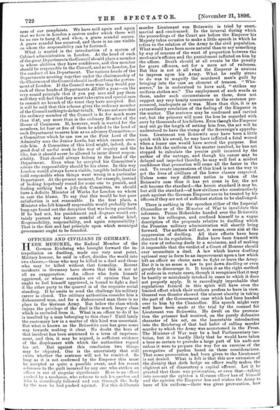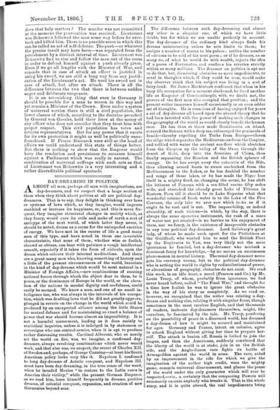OFFICERS AND CIVILIANS IN GERMANY. H ERR MUNCKEL, the Radical Member
of the German Reichstag who brought forward the in. terpellation on duelling, made one very neat point. Military honour, he said in effect, divides the world into two classes,—those who may be killed in a duel and those who may be killed without that formality. Recent incidents in Germany have shown that this is not at all an exaggeration. An officer who feels himself aggrieved, or whose comrades are of opinion that he ought to feel himself aggrieved, is bound to fight a duel if the other party to the quarrel is of the requisite social standing. If he omits to send the challenge his military career is closed. The military authorities consider him a dishonoured man, and for a dishonoured man there is no place in the German Army. But below the class which enjoys the privilege of the duel is the much larger class which is excluded from it. What is an officer to do if he is insulted by a man belonging to this class ? Until lately the customary law in a matter of this kind was uncertain. But what is known as the Briisewitz case has gone some way towards making it clear. No doubt the hero of that incident has been sentenced to a term of imprison- ment, and this, it may be argued, is sufficient evidence of the displeasure with which the authorities regard his act. But against this conclusion two things may be objected. One is the uncertainty that still exists whether the sentence will not be remitted. So long as it is not confirmed by the Emperor this must be accepted as quite a possible event, and his recent reference to the guilt incurred by any one who strikes an officer is one of singular significance Here is an pacer pushed by a mechanic, who refuses to ask his pardon and who is accordingly followed and run through the body by the man he had pushed against. For this deliberate murder Lieutenant von Briisewitz is tried by court-. martial and condemned. In the interval during which the proceedings of the Court are before the Emperor his Majesty takes occasion to make a little speech in which he refers to the relation of the Army to the civil population. What would have been more natural than to say something by way of censure of the want of proportion between the mechanic's offence and the punishment inflicted on him by the officer. Death should at all events be the penalty for grave offences, not for a mere act of rudeness. But this is not at all what the Emperor is anxious to impress upon his Army. What he really strove to do was to magnify the murdered man's guilt by bringing into the case an element of treason. " Who- soever," he is understood to have said, " strikes my uniform strikes me." The employment of such words as these, under such circumstances as these, does not suggest any very hearty concurrence in the sentence pro- nounced, inadequate as it was. More than this, it is an extraordinary revelation of the feeling of the Emperor in the matter. The sentence may be confirmed and carried out, but the prisoner will none the less be regarded with envy by thousands of his fellows. Even though the Emperor may not go the length of setting him free, the act will be understood to have the stamp of the Sovereign's approba- tion. Lieutenant von Brusewitz may have been a little quick with his sword, he may have inflicted a fatal wound when a lesser one would have served the purpose. But he has felt the uniform of his master insulted, he has not stopped to calculate the precise guilt incurred by the author of the outrage, and though his career may be delayed and impeded thereby, he may well feel a modest confidence that promotion will come all the faster in the end. To create impressions of this kind is not the way to get the lives of civilians of the lower classes respected. Unless some very different notice is taken of the Brilsewitz case than it has yet come in for, the act will become the standard—the heroic standard it may be, but still the standard—of how civilians who constructively push against the German Emperor are to be treated by his officers if they are not of sufficient station to be challenged.
There is nothing in the speeches either of the Imperial Chancellor or of the Minister of War to invalidate this inference. Prince Hohenlohe handed over the Briiseivitz case to his colleague, and confined himself to a vague description of the proposals relative to duelling which the Prussian military administration will shortly bring forward. The authors will not, it seems, even aim at the suppression of duelling. All their efforts have been directed to its regulation. Rules have been framed with the view of reducing duels to a minimum, and of making it impossible that the verdict of a Court of Honour should ever necessitate a dueL A law which leaves duelling optional may iu form be an improvement upon a law which left an officer no choice save to fight or leave the Army. But it is in no sense a law to put down duelling or even greatly to discourage it. It treats it as the right method of redress in certain cases, though it recognises that it may be hastily or mistakenly invoked in cases to which it does not properly apply. It is exceedingly improbable that regulations framed in this spirit will have even the limited effect which their authors profess to have in view. General von Gossler showed the utmost alacrity in taking the part of the Government case which had been handed over to him by the Chancellor. His speech might very well have been made at the trial by the counsel for Lieutenant von Briisewitz. He dwelt on the provoca- tion the prisoner had received, on the purely defensive character of his act, on the lamentable introduction into the Reichstag of that bad habit of calling murder murder to which the Army was accustomed in the Press. The Minister of War may be a bad Parliamentary tac- tician, but it is hardly likely that he would have taken a tone so certain to provoke a large part of his audience unless it were to prepare the way for an exercise of the prerogative of pardon based on these considerations. That some provocation had been given to the Lieutenant is not denied. What is felt is that this new extension of the divinity that doth hedge an officer really makes the slightest act of discourtesy a capital offence. Let it be granted that there was provocation, or even that—taking into account the opinion a German officer has of himself and the opinion the Emperor has and wishes the Army to have of his uniform—there was great provocation, how
does that help matters ? The murder was not committed at the moment the provocation was received. Lieutenant von Briisewitz followed the man some way before he over- took and killed him. There is no possible sense in which this can be called an act of self-defence. The push—or whatever the precise insult may have been—was separated from the punishment by a distinct interval of time. Lieutenant von Brusewitz had to rise and follow the man out of the room in order to defend himself against a push already given. Even if we go all lengths with the Minister of War, and concede that in case of attack an officer is justified in using his sword, we are still a long way from any justifi- cation of the Lieutenant's act. He used his sword not in case of attack, but after an attack. There is all the difference between the two that there is between sudden anger and deliberate vengeance.
It is an astonishing thing that even in Germany it should be possible for a man to reason in this way and yet remain a Minister of the Crown. Even under a system of universal service there is still a civil population, the lower classes of which, according to the doctrine preached by General von Gossler, hold their lives at the mercy of any officer who does not consider that they treat him with proper respect. This civil population has votes and returns representatives. But for any power that it exerts for its own protection it might as well be politically unen- franchised. If Prince Bismarck were still at the head of affairs we could understand this state of things better. But there is nothing to show that the Emperor would have the resolution and persistence to measure himself against a Parliament which was really in earnest. The combination of universal suffrage with such acts as that of Lieutenant von Briisewitz is a very interesting and a rather discieditable political spectacle.























































 Previous page
Previous page